CAA Week 6 Notebook: Familiarity Breeds Respect
CAA Week 6 Notebook: Familiarity Breeds Respect
Direct ties to the history of the Colonial Athletic Association shape the conference's identity in the present, and for the future.
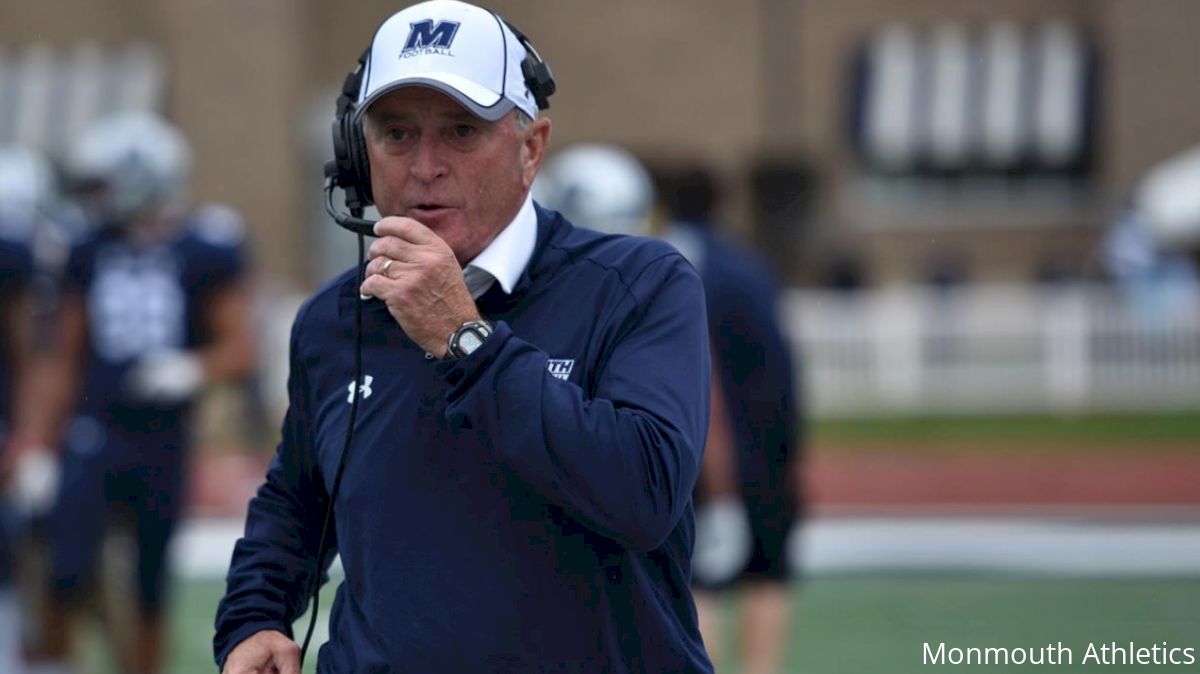
No one could blame Kevin Callahan for not having the clearest memories of a particular matchup opposite Greg Gattuso.
After all, the final ECAC Bowl ever played, pitting Callahan's Monmouth Hawks against Gattuso's Duquesne Dukes, went down 19 years ago in November. Callahan's current Monmouth roster has freshmen who were but a gleam in their parents eyes that day. What's more, the 12-10 finish didn't provide much in the way of scrapbook material.
"You're really taking me back with that. I know we lost," Callahan said of his memory's from that contest.
True, but it's fair to say he recovered. Callahan's coached 117 Monmouth wins since then, taken the Hawks to the NCAA Playoffs for the first time, and produced a winning percentage of no worse than 63.6 each of the last five seasons prior to 2022.
Monmouth's also won its first-ever Colonial Athletic Association game in spectacular fashion, outgunning Villanova 49-42 in an early Game of the Year contender. So, it's safe to say the 2003 ECAC Bowl defeat had no ill effects on Callahan's career. If nothing else, it provided a fitting, preemptive introduction to the CAA coaching fraternity for the coaches on both sidelines that day.
Last week's edition of the CAA Notebook mentioned the CAA ties rooted from the old ECAC Bowl, a postseason contest in which Gattuso coached the last three years of its existence opposite current Colonial contemporaries Callahan and Rhode Island's Jim Fleming.
Much has changed since a time when cell phones could never possibly get any more advanced than the Sidekick; that much is evident referring to an Asbury Park Press ECAC Bowl scouting report column, written by then-Iona coach Fred Mariani. Duquesne and Iona both played in the Metro Atlantic Athletic Conference at the time; the MAAC ceased football in 2007, one year before Iona's program shuttered.
The context of the column itself, however, suggests something have remained the same in the last two decades.
"They love to throw the football," Mariani wrote of the Duquesne offense. "But they also have the ability to run the ball."
Point production has grown exponentially for Gattuso's team, but a philosophy of offensive balance has remained the hallmark. To wit, UAlbany has rushed 118 times on the season and passed 124 through the Great Danes' first four games.
In prepping for UAlbany — an opponent Monmouth most recently beat in an overtime thriller three years ago — Callahan's reminded of other similarities to that ECAC Bowl.
"His teams are always very well-coached," Callahan said of Gattuso. "They play hard. They're very disciplined in everything that they do. His teams at [UAlbany] have been made in that same mold."
Gattuso joked that he "remembered [the ECAC bowl] better" than Callahan — presumably having come out on the winning side. But the UAlbany coach more so came away impressed with Monmouth under Callahan's direction.
"I remember hitting a slant play for the winning touchdown," Gattuso said of Niel Loebig finding Michael Warfield for a 60-yard score in the fourth quarter of that matchup. "Feeling very fortunate to get out of that game alive, because they were very good.
"Kevin's one of the good guys of the profession, in my mind," he added. "This conference has had a lot of guys like that."
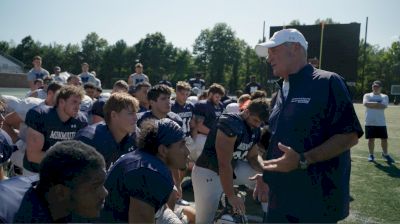
The success of the CAA, both past and present, runs through the continued connections to exactly the kind of coaches to whom Gattuso alluded.
Not many conferences at any level of football can stake claim a collection of coaching legends as impressive as the CAA. Andy Talley is a College Football Hall of Famer, and recently retired Sean McDonnell is certain to join him when his time on the ballot comes.
Jimmye Laycock doesn't qualify for the College Football Hall of Fame due to an arbitrary minimum career-win percentage, but any connoisseur of the game knows his impact; it's evident all over the NFL from the William & Mary coaching tree.
And speaking of the NFL, none other than Peyton Manning shouted out a CAA legend on the Oct. 3 Monday Night Football ManningCast, referencing the late Hall of Famer Tubby Raymond's Wing-T offense.
Tubby Raymond would be #proUD 🥹 pic.twitter.com/FkSZ78vqiB
— Delaware Blue Hens (@UDBlueHens) October 4, 2022
Delaware's a long way from the Wing-T under current Blue Hens alum Ryan Carty, but the influence of both the program's rich history as well as the lineage of the conference are evident in his background.
A young Carty played for national championship-winning K.C. Keeler at Delaware before rejoining the coach at Sam Houston. There, Carty helped Keeler's team to another national title at the culmination of the spring 2021 season.
"Ryan and the [Delaware] staff have done a good job of just identifying that 'Delaware Way'," William & Mary coach Mike London said. "I was coaching back when Tubby Raymond was coaching, and that goes way-way back...But Delaware's always been a good football team. It's been one of those tough, aggressive, blue-collar football teams over the years, and that's what they are now."
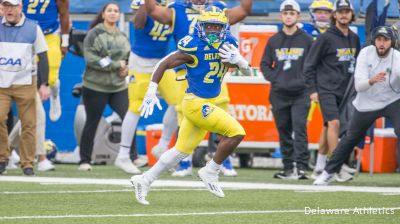
In between his runs with Keeler, Carty cut his coaching teeth under McDonnell at New Hampshire — a proven gateway to head-coaching success.
Carty coached running backs in 2009 — the same position group current UCLA head coach Chip Kelly oversaw in Kelly's first stint with the Wildcats — contributing to New Hampshire's playoff streak during a season dominated by the CAA.
Four Colonial teams reached the postseason and advanced to the quarterfinals, two went to the semifinals, and Villanova won the championship. It marked the second CAA national title in as many years, following Richmond's tournament run under current William & Mary coach London in 2008.
As undefeated Delaware prepares for a Week 6 showdown with the Tribe, Carty described the championship formula London had at Richmond and how it's translated to William & Mary now.
"It's why he is who is, and why he's been so successful as a head coach. Those guys are well-coached," Carty said. "They're tough, they play with an edge. They know where they're supposed to be and they get there pretty fast on defense, and on offense, they've always been able to run the football, make big plays in the pass game. [London] always recruits really good kids [who] can make plays."
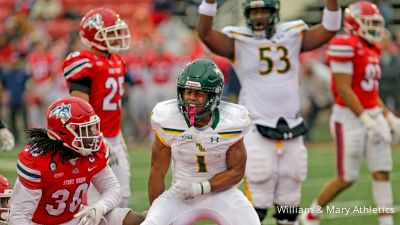
London's last season at Richmond, 2009, coincided with Rob Ambrose's first campaign at the helm for Towson.
While he was a Towson alum and Tigers assistant coach, Ambrose spent nearly a decade away from the program as a head coach at Catholic University and assistant during Connecticut's Golden Age as an FBS program.
"I was so far removed when I came back from UConn, it took me a year just to figure out what the zero level is; what's the ground floor?" Ambrose said.
Ambrose figured it out; he became the longest continuously tenured head coach specifically in the Colonial with McDonnell's retirement at the end of the 2021 season. He faced "Coach Mac," Talley and Laycock in his tenure at Towson.
He's also faced his share of branches from the various coaching trees and will take on one such leader in Week 6 when the Tigers visit red-hot Elon and head coach Tony Trisciani. Trisciani is a former assistant to both McDonnell and Talley.
"The history of the league has created good coaches, good players, good players who end up becoming good coaches. Go up to New Hampshire; everybody's a player there," Ambrose said. "The quality of ball all-around, in any aspect, what you're seeing is the result of that over decades worth of time. There's just been great coaches, who have mentored great young coaches, who ended up growing up and filling their shoes.
"I couldn't speak more highly of this league if I tried, and the good part about it is, if you'll notice, if a coach who has coached in this league ends up going to another team in this league, the time for turnaround for that job is less because of the internal knowledge this individual would have over years within the league, knowing what the culture is at other universities, who the players are, what the strengths and weaknesses are."
That level of familiarity has bred parity. Every current CAA program that was in the conference before 2022 has represented the league in the FCS Playoffs at least once since 2015, save Rhode Island; Monmouth's been twice in that stretch, albeit not under the CAA banner.
Four of the current members have played in a National Championship Game since 2008. All four maintain a direct tie to the coaching staffs that oversaw those title-game runs.
- Delaware, 2007 and 2010: K.C. Keeler (Ryan Carty)
- Richmond, 2008: Mike London (Russ Huesman)
- Villanova, 2009: Andy Talley (Mark Ferrante)
- Towson, 2013: Rob Ambrose
Presented in this context, it's easy to see why the conference-at-large continues its ties to history while building for its future — from Delaware bringing home an alum in Carty, to Maine and New Hampshire tabbing former pupils of Jack Cosgrove and Coach Mac, Jordan Stevens and Santos.
And even with newcomers to the league — relatively new in Gattuso's case, literally in Callahan's — the deep historical roots allow the Colonial to continue to flourish.
So Many Ways to Score
With his 26-yard touchdown reception from Max Brosmer last week at Western Michigan, New Hampshire running back Dylan Laube became the first CAA player this season to score in three different ways. He reached pay dirt on the run twice against Monmouth and three times in the Week 2 win over UAlbany, then ran back a punt for six against Towson, adding 92 yards to his FCS-leading 20.5 yards per return.
Dylan Laube to the 🏡!@UNH_Football extends the lead on a 92-yard punt return TD.
— CAA Football (@CAAFootball) September 24, 2022
📺 @FloFootball
➡️ https://t.co/wZhH1155bM pic.twitter.com/IxwqlDUFnF
All told, Laube ranks second in the nation in all-purpose yards at a little more than 180 per game. Rick Santos said the New Hampshire will continue to strategize ways to get Laube touches, including more return opportunities and possibly even lining up wide.
"For him, he feels comfortable making plays out of the backfield," Santos said. "He's someone that's extremely versatile and allows us flexibility as we're calling plays in different, creative ways to get him the ball. He's a hecukva football player, and I'm glad he's on our team."
New Hampshire has also scored across all three phases as a team, having done so in a single game back in Week 1 vs. Monmouth. The only other CAA team with touchdowns in each phase is Towson, which got a 96-yard kickoff return for a score from D'Ago Hunter at West Virginia; and last week, added a 97-yard pick-six from Robert Javier.
"When you can put three phases of aggressive point-scoring [together]...on a consistent basis, the growth of your program multiplies by 10," Ambrose said.
Experiencing Loss
Three of the nation's 10 leaders in overall tackles for loss hail from the CAA: William & Mary linebacker John Pius at 12.5 (No. 1); Stony Brook safety Carthell Flowers-Lloyd at 10 (No. 4); and Elon linebacker Marcus Hillman at (No. 10). All three rank in the top 21 nationally for TFL per game, and Hampton linebacker Mason King joins them in that category.
Not only are these defenders stacking up impressive numbers presented on their own, but the timeliness of some contributions have been key. Elon's Hillman is coming off another week — his third in a row — with a big second half to aid in a Phoenix rally.
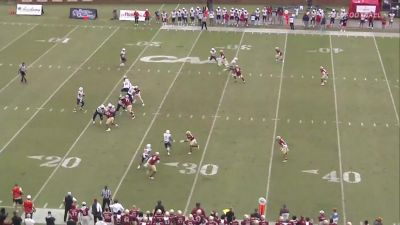
"He's extremely talented, but he's also a very smart football player," Elon coach Tony Trisciani said of Hillman. "He's savvy, he can recognize things, and he's a very slippery defender."